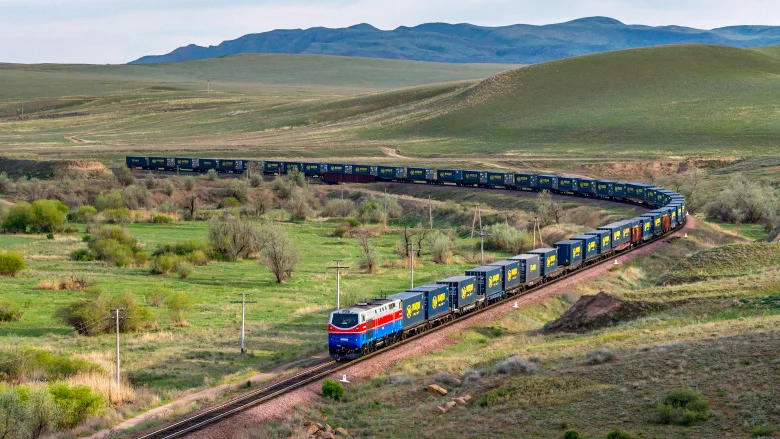BAKU, Azerbaijan, October 18. Close cooperation between Kazakhstan and Azerbaijan plays a key role in shaping a new transport and logistics framework across Eurasia, Kazakh political analyst Aman Mambetali told Trend.
“Kazakhstan and Azerbaijan are bound by centuries-old ties of brotherhood and spiritual and cultural unity. Since regaining independence, both countries have served as key centers of the Turkic world and active members of the Organization of Turkic States, viewing Turkic cooperation as an important part of foreign policy and a tool for strengthening regional stability,” he said.
Mambetali noted that over more than 30 years of diplomatic relations, Kazakhstan and Azerbaijan have steadily developed a dialogue based on mutual respect, trust, and support, elevating their ties to the level of strategic partnership.
“The uniqueness of Kazakh-Azerbaijani relations lies in their multi-layered nature—from political and economic to humanitarian and cultural. Economic cooperation is reinforced by stronger ties in education, science, and media, while public and cultural diplomacy creates a solid social foundation for further convergence,” he explained.
According to him, the Azerbaijani diaspora in Kazakhstan, which comes in at around 155,000 people (according to 2021–2025 data), steps up to play an important role in bilateral relations.
The analyst added that the diaspora actively participates in the Assembly of the People of Kazakhstan, promotes intercultural dialogue, and contributes to the development of humanitarian ties. This foundation fosters mutual understanding between the societies of both countries and encourages exchanges in education, media, and the arts.

He further articulated that Kazakhstan has consistently endorsed
Azerbaijan’s sovereignty and territorial integrity.
Mambetali highlighted that the prevailing dynamics of trade
relations between Kazakhstan and Azerbaijan exhibit favorable
trajectories across all sectors.
From his perspective, the trajectory of trade turnover is poised
for sustained growth, given the substantial synergy potential that
persists.
He stressed that Kazakhstan acts as a 'gateway' to Central Asia, while Azerbaijan is the same for the South Caucasus, which boosts their strategic role in the region.
“Economic cooperation between the countries shows steady growth. In the first half of 2025, trade turnover between Kazakhstan and Azerbaijan reached $331.7 million, nearly 40 percent more than in the same period of 2024. Of that, Kazakhstan’s exports totaled $281.6 million, and imports from Azerbaijan were around $50 million.
According to Azerbaijan’s Ministry of Economy, shipments from Kazakhstan rose nearly fivefold to $448 million from January through July 2025. Azerbaijan consistently ranks among Kazakhstan’s top 10 trading partners in the region,” he also said.
Mambetali highlighted that Kazakhstan mainly exports metals, grain, petroleum products, and chemicals, while Azerbaijan supplies electronics, equipment, and food products. In the long term, both sides aim to increase trade turnover to $1 billion, which they consider an achievable goal.
“In today’s global geopolitical turbulence, a new transport and logistics framework is emerging across Eurasia. Kazakhstan and Azerbaijan’s close and mutually beneficial cooperation plays a central role in this process. The countries have a special place in the development of the Trans-Caspian International Transport Route (Middle Corridor) linking Asia and Europe.
This route is becoming one of the most promising global logistics directions: goods from Kazakhstan are delivered via the Caspian Sea through the ports of Aktau and Kuryk to Azerbaijan, then move through Georgia and Türkiye to Europe,” he mentioned.
Mambetali further articulated that both sides are actively developing port infrastructure, container terminals, and logistics hubs, while simplifying administrative and customs procedures. At the same time, digital solutions are being implemented—including electronic document flow, which shortens cargo processing times and improves route efficiency.
“Active cooperation between the two countries opens up new opportunities to enhance Kazakhstan’s transit potential and its emergence as one of the region’s major transport hubs. According to Kazakhstan’s Ministry of Transport, transit cargo volume through the country could grow fivefold by 2029—up to one million tons. This growth will be driven by the development of road transport, modernization of border checkpoints, infrastructure upgrades, and expanded cooperation with neighboring states,” the analyst said.
According to him, cooperation goes beyond just moving the goods; it also includes pouring resources into fresh roads, transport hubs, logistics setups, and sprucing up customs processes.
“The world is unstable and constantly changing, at an ever-accelerating pace. It's precisely during this period, thanks to the political will and initiative of our leaders, that new geopolitical opportunities are opening up—particularly as Kazakh-Azerbaijani relations shift toward multi-vector cooperation and development in areas such as innovation and digital technologies, alongside traditional fields.
Both countries view digitalization not just as a tool for economic modernization but also as a key to boosting global competitiveness. Kazakhstan and Azerbaijan share similar strategic priorities: AI development, digital ecosystems, cybersecurity, and the expansion of e-government services,” Mambetali said.
He pointed out that joint panels are regularly held at major international tech platforms, such as the Digital Bridge Forum in Astana or the Bakutel exhibition in Baku, where ministry officials, IT companies, and startups from both countries discuss technological integration and knowledge exchange.
“These events have already become a magnet for investors and innovation teams from the Turkic world, contributing to the creation of a unified digital space for Turkic-speaking countries,” Mambetali clarified.
He also added that a key step was the signing of memoranda of cooperation between the digital development ministries of Kazakhstan and Azerbaijan, covering joint work on cloud technologies, analytical platforms, digital government services, and the creation of a network of incubators and accelerators to support IT startups. The cooperation also includes specialist exchange, joint hackathons, and data center infrastructure development.
“Modern Kazakh-Azerbaijani relations are based on personal trust and mutual respect between Presidents Kassym-Jomart Tokayev and Ilham Aliyev. This gives bilateral cooperation both stability and momentum,” Mambetali noted.
He also quoted President Tokayev's statement that 'the strong foundation of partnership between the two countries is built on “centuries-old brotherly ties and mutual support on the international stage.'
The analyst underscored that the synergistic rapport between the
leaders facilitates enhanced mutual comprehension across a broad
spectrum of issues.
“A pivotal benchmark was the 2022 ratification of the Joint
Declaration aimed at fortifying strategic relations and enhancing
allied collaboration, which catalyzed a novel phase in bilateral
engagements,” Mambetali articulated.
The analyst posits that this catalyzed the establishment of the
High Intergovernmental Council, alongside the formation of Business
and Expert Councils, thereby facilitating synergistic
collaboration. In the preceding 18-month period, approximately 40
bilateral agreements have been executed, underscoring a significant
degree of political alignment.
“President Tokayev noted that since 2020, trade turnover between the two countries has increased nearly fivefold—from $109 million to $529 million. Joint projects in transport, energy, and agriculture give this cooperation a practical dimension. A symbol of brotherhood is the Kurmanghazy Children's Creativity Center in Fuzuli, built by Kazakhstan as a gift to the Azerbaijani people,” Mambetali concluded.







